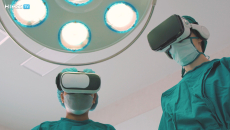virtual reality
Immersive technologies offer powerful new tools for mental healthcare, but their implementation must be grounded in clinical principles and executed with competence.
The training program from Edith Cowan University is expected to be released by early 2026.
The announcement comes just three months after XRHealth announced it acquired cognitive training VR platform NeuroReality and its assets.
Josh Sackman, president and cofounder of AppliedVR, provides MobiHealthNews with an overview of the medical XR space. He focuses on the challenges and progress in the sector.
Immersive virtual reality can help create simulated scenes that mirror the real world and simplify it, says Floreo CEO Vijay Ravindran. That is why VR is beneficial for teaching neurodiverse individuals life skills.
Thomas Hutchinson, executive director of digestive health and experiential reality, and neurosurgeon Dr. Robert Louis discuss utilizing VR and AR to evaluate a patient’s anatomy in 3D and implementing the tech as a preoperative tool.
Bob Fine, executive director and founder of the International Virtual Reality Healthcare Association (IVRHA), discusses the 7th Annual Virtual Reality and Healthcare Global Symposium, its evolution, and recent exhibitors and speakers.
How is virtual reality technology finding use in healthcare today? What's stopping it from greater deployment? Where is it headed in 2023? Aaron Gani, CEO of BehaVR, gives insights.
FundamentalVR CEO Richard Vincent says it's important to provide diverse offerings for different surgical training use cases.
In our first episode of "When It Works," intracranial hematoma patient Danielle Collins and George Washington University Hospital's Dr. Walter Jean share how virtual reality helped Collins comprehend her condition.







